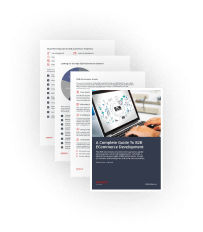An online marketplace, or an e-marketplace, is a website or app that serves as a mediator between customers and companies or individuals offering products or services in the B2B and B2C sectors. Marketplace owners usually don’t offer any products or services themselves. Their task is to provide a platform where marketplace participants interact.
Learn more about the marketplace eCommerce model from A Guide to Marketplace Business Models.
Benefits of multi-vendor marketplace business
Considering marketplace growth and areas yet untapped by this technology, business owners can leverage the marketplace model and build their own unique solutions. Below are some key benefits of running your own marketplace.
1. Revenue
While commissions for listing on your marketplace may be low, the volume of transactions can generate massive revenue. Plus, marketplace owners have several options for monetization which can be combined on one platform to increase the profit. The way marketplace owners derive revenue determines the success of their platform. The most popular monetization models are commissions, listing fees, subscriptions, lead generation fees, advertising, and providing additional services.
2. Efficiency from the start
The cost of releasing a marketplace is almost the same as the cost of launching an eCommerce website. But the perspectives are different. Although the logic behind an e-marketplace is rather complex, its functionality can cater to the specific needs of many different vendors right on the start.
3. A scalable business model
Marketplaces are likely to expand quickly. And if traffic grows quickly, it may be necessary to add more vendors to meet the demand. The only challenge before a marketplace owner, therefore, is to balance supply and demand. High-quality vendors attract more customers, while a growing customer base attracts more vendors.
4. Reduced financial risks
A marketplace requires less financial risk than an eCommerce store as it doesn’t need to invest in inventory. You are out of most issues related to delivery, warehousing, logistics or return policy. These are issues your sellers need to worry about. The essence of the marketplace is linking sellers with buyers, the dirty job of making the seller-buyer transaction happen is not on you.
5. Niche start friendly
eCommerce makes serving niche markets even easier. It can be hard for that rare coin collector to find a seller. Narrow niche marketplaces are easy to launch, find the dedicated audience, distribute products and scale in respect to the product range or geographically.
6. Vendors’ advocacy
It is very convenient when the goals of the owner and the sellers of the marketplace are closely related because sellers themselves attract buyers to their storefront in all possible ways. If you provide them with the necessary tools, you can reduce marketing expenses.
7. Deep automation
A marketplace’s primary source of revenue is usually the sales commission. This requires a high degree of business process automation. There’s no need to do any major paperwork as everything is done automatically within the platform. The same for other business processes that involve payments, vendors, and customers – almost everything can be automated.
8. Value proposition for merchants
Marketplaces give companies a wonderful opportunity to handle their supply that doesn’t require any initial investment in a physical store. Suppliers can create a sort of traditional or electronic business card with ratings and customer reviews so customers can make informed decisions. This can be made quickly and start selling faster.
9. Customer interest by default
One of the major appeals of an e-marketplace is that it brings together offers from multiple suppliers or service providers. Customers are more likely to refer to a broad range of options so they can choose exactly what they want without limiting their choice to a single provider.
10. Global analysis
Marketplace owners can track their sales with accurate metrics. For example, an owner can see which products and services are in demand and know which vendors are most preferred. As a result, the owner can promote goods and services that truly matter to its users.
Start your Multi-Vendor Marketplace today
Still hesitating if a marketplace model business is for you? Learn what marketplace solutions we provide and drop us a line to discuss your project with the expert.

